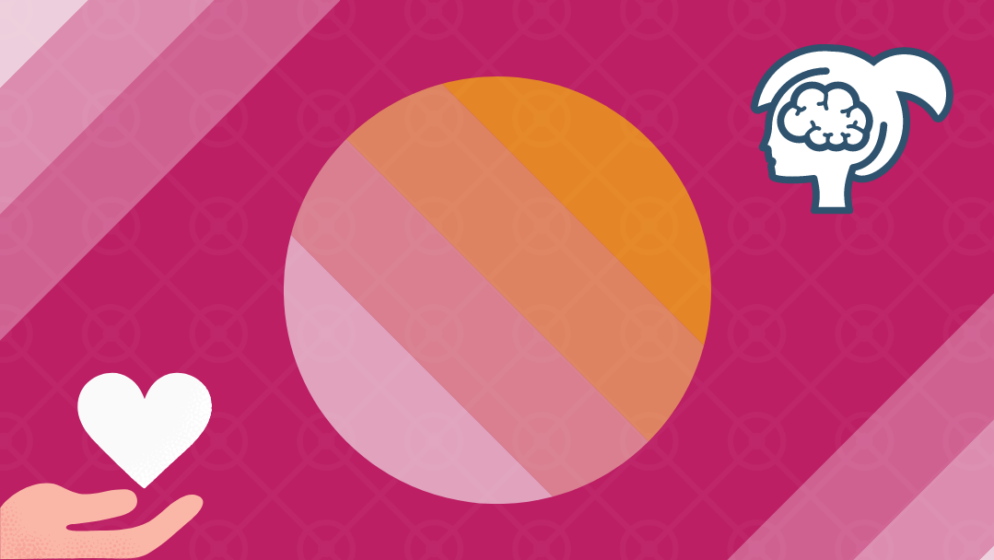As a child of refugees and the first person in her family to be born in the United States, Julia felt the weight of immense pressure to ‘do something amazing’ in order to fit a certain mold of success.
“On top of that, I never developed coping skills for stress and anxiety,” she said. “When I was younger, I was always told to persevere and push through, so I never really developed any skills to recognize when I was going through too much stress and anxiety, and I normalized all of that.”
Although she didn’t realize it at the time, during her junior year of college, Julia experienced a major depressive episode. “I was not getting out of bed, eating very little, and not doing anything for three months, and I was also having anxiety and panic attacks. At the time, I thought, ‘I’m just going through a lot of stress, I need to push through this period.’ It wasn’t until one of those anxiety attacks almost got me in a very serious car accident that I just barely prevented from happening that I realized that I needed to seek help.”
“They asked me about my family history, and so we started talking about values and what I grew up believing. The first time, it felt like they weren’t really listening to me and like they thought that my upbringing was really strange. I think because they found the context that I was describing already disturbing, so we weren’t going to get to the level of being able to talk openly, because they didn’t understand where I was coming from.”
Cultural competence matters
When Julia first sought treatment, she went to school counselors who lacked context for Southeast Asian American experiences. “I told them about why I thought I was going through these mental health issues,” she said. “They asked me about my family history, and so we started talking about values and what I grew up believing. The first time, it felt like they weren’t really listening to me and like they thought that my upbringing was really strange. I think because they found the context that I was describing already disturbing, so we weren’t going to get to the level of being able to talk openly, because they didn’t understand where I was coming from.”
After an initial session with another school counselor, the therapist immediately recommended medical treatment, and Julia didn’t feel comfortable returning.
Julia shared that at first, she hadn’t considered that she would need to seek out a culturally competent therapist. “I thought, ‘they’ll probably understand what I’m going through,’ because I am pretty Americanized; I was born and raised in the United States,” she said. “But I realized that culturally competent care is actually a big factor because not everyone practicing understands the immigrant experience and understands the lengths that people go through to try to live here, and what immigrants and refugees expect from future generations as a result.”
Although Julia’s current therapist is not Vietnamese, she feels a sense of mutual understanding that has allowed her to experience much more productive therapy sessions.
“My current therapist isn’t Vietnamese, but one of the things that has helped is that she understands what it’s like to grow up in a family where there are people who have immigrated and have been through trauma, and the kinds of values that you are brought up with as a result,” Julia said. “I feel like she really listens to me more. Later we landed on maybe I need medical treatment, but I felt like it was one of those moments that people understand where I’m coming from first and allow me to speak, instead of being disturbed by the stuff that has happened in the past.”
“I was taught the idea of resilience all the time (i.e. my family went through these really traumatic experiences, and they made it through), so when I was starting to see red flags, I wasn’t able to recognize them because I just assumed that everyone goes through struggles in life, it’s normal, and I don’t need help, I just need to push through.”
Breaking the stigma
Julia’s first challenge was being okay with needing help and pushing past the stigma around mental health treatment, especially within her family. “I was taught the idea of resilience all the time (i.e. my family went through these really traumatic experiences, and they made it through), so when I was starting to see red flags, I wasn’t able to recognize them because I just assumed that everyone goes through struggles in life, it’s normal, and I don’t need help, I just need to push through,” Julia said. “Looking back, I am like ‘Wow, there were so many signs that I needed to stop what I was doing,’ but I really could not see it at the time.”
It’s also important to note that resisting stigma is an ongoing process.
“I am the first person in my immediate and extended family to need mental health treatment. I am still overcoming this barrier repeatedly and constantly. So sometimes I find myself being like ‘maybe I don’t need mental health treatment anymore, only people with really serious issues need that,’ she said. “I find myself going through this narrative because it’s something that I’ve internalized from my family. There are no positive views of mental health in my community and in my family.
“Every single time someone needs mental health treatment, it’s seen as if they’re ‘crazy.’” Even though my parents are understanding now, the narrative of the word ‘crazy’ still frames how I understand mental health,” she added. “In Viet, it’s bị điên, and there are no other words to explain the nuances of mental health, it’s literally just ‘you’re crazy.’ It has been really tough to not know any other person in my family who is viewed in a positive light who is receiving mental health care and treatment.”
Mental health: an ongoing journey
Graduating from college last June in the middle of a pandemic has had a profound impact on Julia’s mental health journey. “I feel lucky in a sense that I realized that I have to pay attention to my mental health and not normalize depression and anxiety, not just tell myself ‘oh it’s just First World problems, and I just need to push through,” she said. “Having graduated from college during the COVID-19 pandemic has been so much of one tragedy after another in the news, so having learned how to cope and seek help was really important for me.”
Something that Julia is working on is pushing back on the idea that ‘being productive’ is the end-all, be-all. “For me, I like to doodle, draw, and read, and it sounds basic, but I didn’t do this for a long time since I was in high school because I had such a pressure from my family to do more,” she said. “Because my parents had their opportunities taken away, I needed to spend every moment to make their sacrifices worthwhile. Learning how to let go of that and doing things just because I enjoy them was huge for me. I am still practicing everyday, because sometimes I still fall into the trap of, ‘Oh no, what am I doing with my life? Reading this book isn’t going to get me a job.’”
To those considering seeing mental health treatment, Julia has the following words of encouragement:
“I would say that it’s okay to need someone to help you work out what’s going on in your brain, and it’s okay to talk it out. I think emphasizing that therapy should be one of your strengths, and therapy is a toolkit for how you can be better and kinder to yourself. Rather than viewing therapy as a weakness, you can view therapy as if you’re equipping yourself with tools to build strengths and skills. Therapy helps to understand where you need help and how to actively address those areas.




